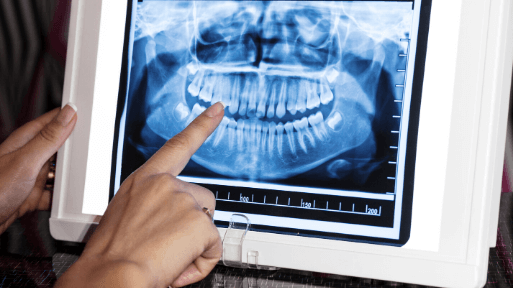
Dental X-rays are a common diagnostic procedure that’s considered extremely safe. Producing just a fraction of the radiation you are exposed to in other imaging procedures and roughly the same amount you’d experience on a two-hour flight, digital dental X-rays produce very low doses of radiation. To better understand why dental X-rays are performed, when to use special precautions, and how they’re best handled, let’s take a deeper look into the process.
Who Needs Dental X-Rays
If you have a history of cavities or excessive decay or other dental problems, you’ll likely need more X-rays than other people. But if you have a healthy mouth and aren’t at high risk for dental decay, you do not necessarily need X-rays every year. However, keep in mind it’s important to discuss your specific needs with your dentist.
Generally speaking, dental X-rays are used as a diagnostic tool to help dentists see issues that are otherwise difficult to detect during routine treatment. Using these X-rays, your healthcare provider can see:
- Areas of decay, including those in between teeth or underneath a filling
- Bone loss associated with gum disease
- Abscesses or other infections
- Tumors
Without an X-ray, many of these problems could be left undiagnosed and untreated.
Dental X-Rays During Pregnancy
Pregnant women are generally advised to avoid dental X-rays. Though the radiation is minimal, it’s best to avoid all exposure, if possible, for the health of the developing fetus. For this reason, it’s important to tell your dentist if you are or may be pregnant.
Dental X-Rays and Children
Not surprisingly, many parents are concerned about dental X-rays on children. While children are more sensitive to radiation, the amount of radiation in a dental X-ray is still considered a safe level for a child. Because children’s teeth and bone structure change rapidly, it’s important to monitor their development frequently. X-rays performed on young patients can help dentists:
- Make sure the mouth is large enough to accommodate incoming teeth
- Monitor incoming wisdom teeth
- Identify decay and gum disease early
Safety Measures
Dental X-rays are considered extremely safe, but it’s important to understand the purpose of any procedure that will expose you to radiation. Speak to your dentist about how you can plan an active role in the safety of your treatment plan. For example, ask your dentist about using the lowest radiation setting possible and a leaded apron to protect your body.
Schedule an Appointment Today
Want to talk to your dentist about dental x-rays to see if they’re right for you? Make an appointment with us today. We’d be glad to help you better understand all the ways in which we strive to protect your oral health.

